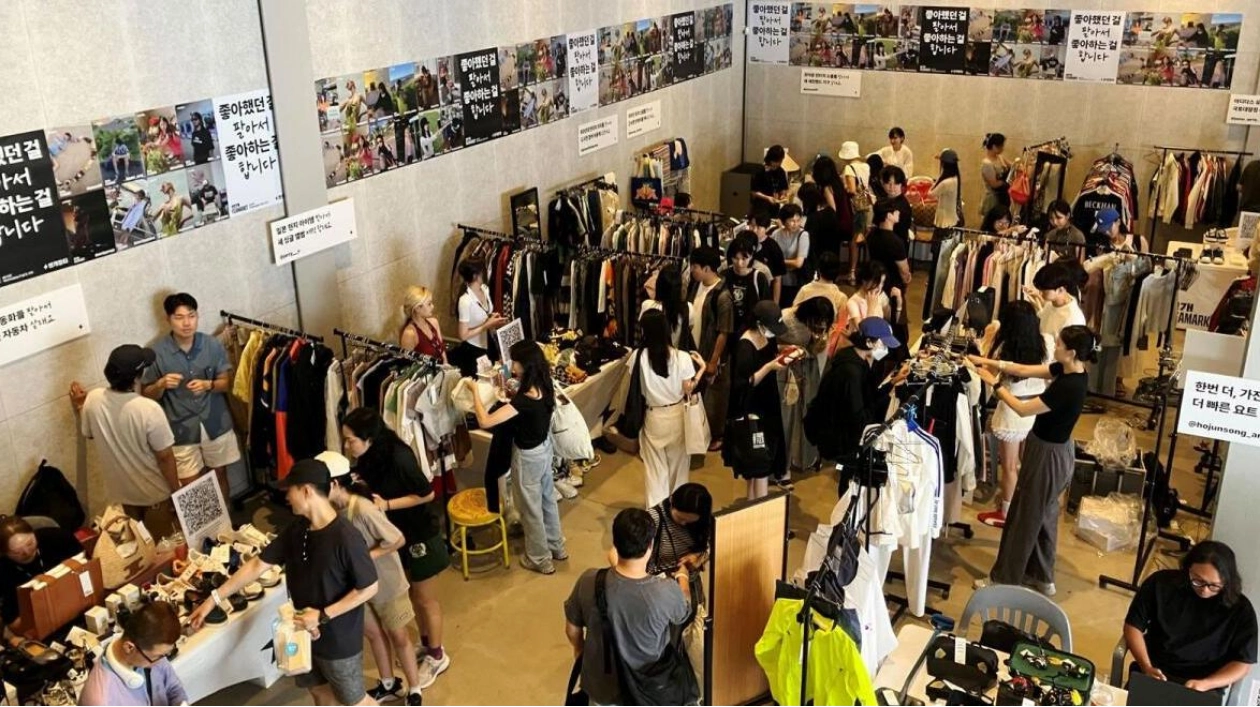As South Korea grapples with its plummeting birth rate, policymakers struggle to persuade the younger generation that having children is a wiser investment than indulging in fashion or dining out. The nation, Asia's fourth-largest economy, is set to establish a new government ministry focused on demographic issues, following years of unsuccessful incentives aimed at addressing the baby crisis. For Park Yeon, a 28-year-old fashion influencer and aspiring singer, her spending is largely driven by her passion for clothes and travel, leaving minimal room for thoughts of marriage and children. "I live by the YOLO principle," Park remarked while selling her Supreme T-shirts at a thrift fashion event in Seoul's trendy Seongsu-dong district. "There's hardly any money left to save each month after treating myself. Marriage might happen someday, but happiness now is what matters most, right?" South Korea continues to set records with the world's lowest birth rate, which reached a new low last year. Sociologists note that the spending habits of Koreans in their 20s and 30s, belonging to Generations Y and Z, indicate they save less and spend more on average than the general population or their counterparts in other nations, which does not bode well for starting families. "They are focused on status symbols. Their high spending reflects a pursuit of personal success markers online rather than traditional goals like settling down and having children," explained Jung Jae-hoon, a sociology professor at Seoul Women's University. Despite South Korea's aggressive interest rate hikes over the past three years, youthful spending has not been curbed. Savings rates for those in their 30s dropped to 28.5 percent in the first quarter from 29.4 percent five years ago, while savings for other age groups increased, according to central bank data. Meanwhile, individuals in their 20s and 30s dominate spending at department stores and luxury hotels, with their travel expenditures rising to 40.1 percent from 33.3 percent over the past three years. The proportion of spending by those in their 20s at high-end department stores nearly doubled to 12 percent in the three years to May, while spending by other age groups declined, according to Hyundai Card data. Last year, revenue at upscale buffet restaurants surged 30.3 percent, compared to a 10.5 percent increase at fast food restaurants and a 9 percent rise across the dining industry, according to Euromonitor. Sales at Seoul Dragon City Hotel's 90,000 won all-you-can-eat strawberry dessert offering jumped 150 percent from the previous winter, even after a 12.5 percent price increase. In contrast, Australians aged 25 to 29 reduced their spending by 3.5 percent in the first quarter of 2024 due to cost-of-living pressures, according to a Commonwealth Bank of Australia report. Koreans have become the world's largest per-capita spenders on luxury brands, according to Morgan Stanley's research, and a prime destination for luxury brands. Chanel, Celine, and Dior have all partnered with teen-focused K-pop groups like Blackpink and NewJeans as global brand ambassadors. Financial difficulties are the primary reason South Koreans cite for not having children, according to a PMI Co. survey in May. About 46 percent of respondents blamed job uncertainty or education costs. Annual incomes for those in their 20s and 30s rose only 2.0 percent last year, slower than the 4.5 percent increase for all households, according to Statistics Korea. Jung noted that the focus on immediate gratification among youth also explains their lack of response to government subsidy-based policies to boost birth rates. The Yoon Suk Yeol administration announced in May the creation of a new ministry to address demographic issues, after numerous policy measures failed to reverse the declining birth rates. In a 2021 US Pew Research Center survey of 17 advanced countries, South Korea was the only nation where material well-being topped the list of what makes life meaningful, unlike other countries where family or health was prioritized. For Park, having children is a consideration she might entertain if her singing career succeeds. "If my career goes well, savings, marriage, and all that will follow. Right now, enjoying life and pursuing my dream job are my main priorities," she said.

Text: Lara Palmer
27.08.2024
Policymakers struggle as young South Koreans opt for luxury spending over starting families





